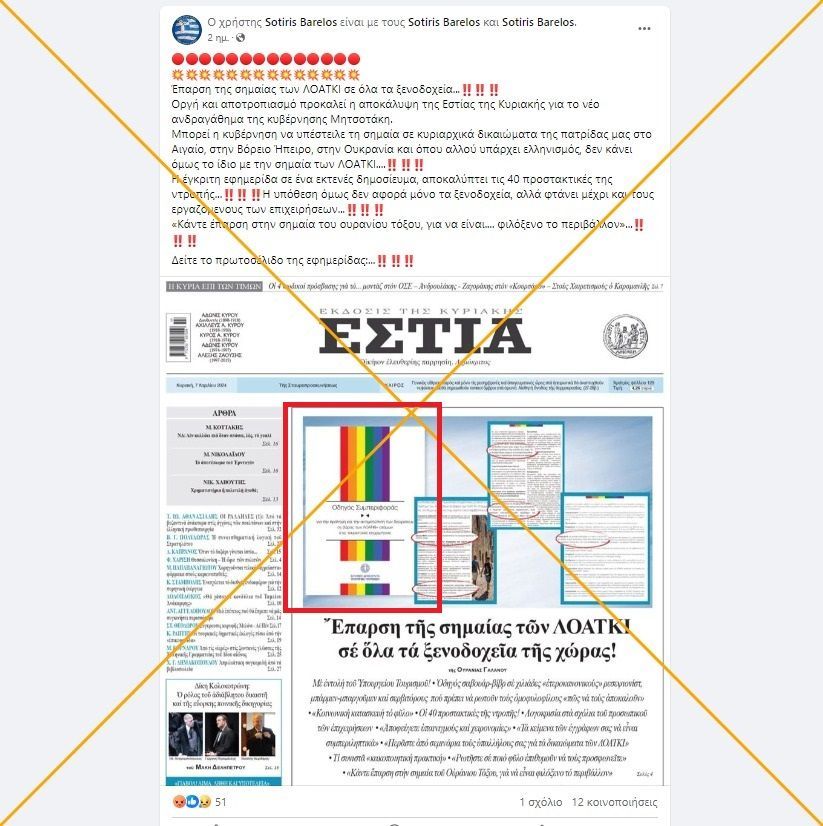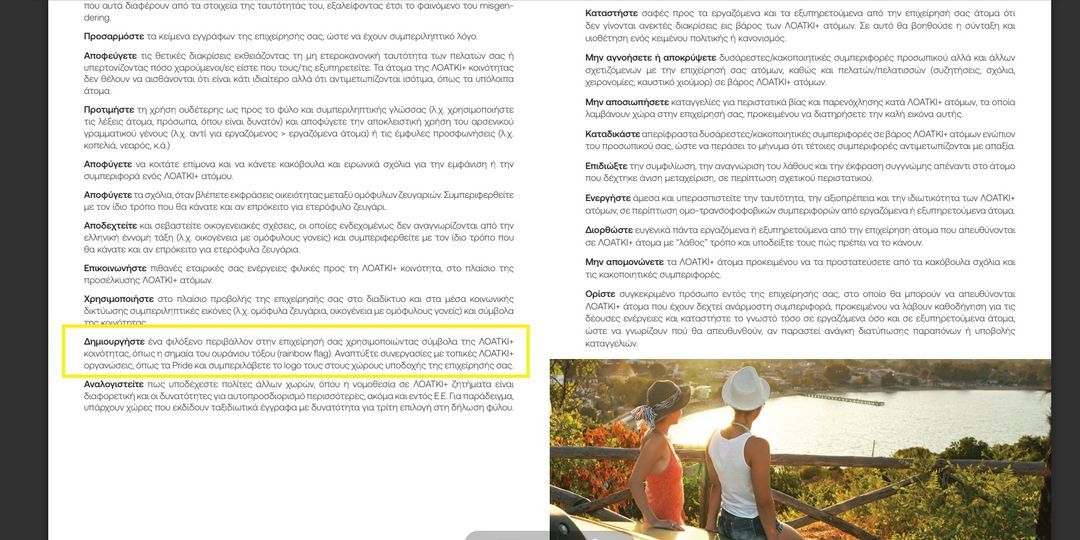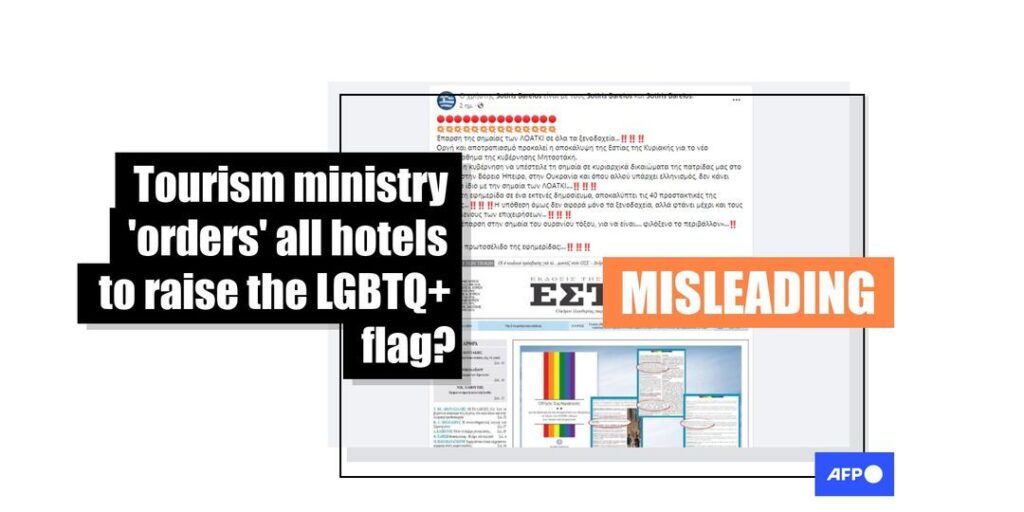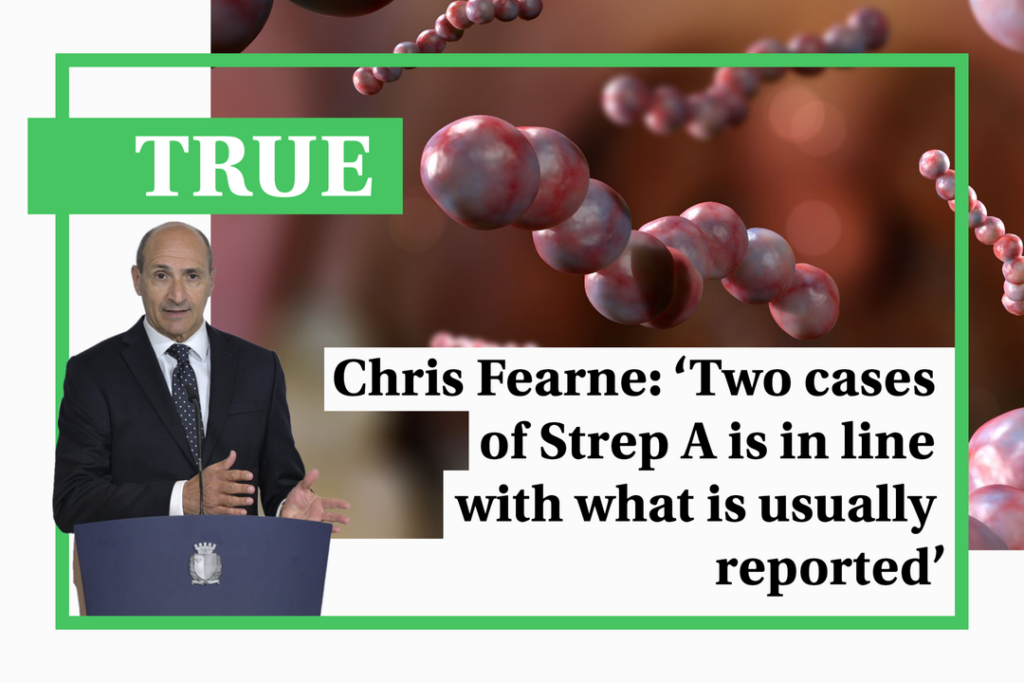The Greek government has not issued a binding “order” to hotels to fly the rainbow flag, contrary to claims circulating on Greek social media since early April 2024. While the tourism ministry did issue guidelines to hotels on how to make their establishments more LGBTQ+-friendly, these were voluntary recommendations, as is clear from the original document and as the Hellenic Chamber of Hotels confirmed to AFP. Moreover, displaying the rainbow flag was mentioned as only one example of a symbol that could be used to make LGBTQ+ customers feel welcome. The claim is the latest example of misinformation targeting the LGBTQ+ community since the legalisation of marriage and adoption for same-sex couples in mid-February.
“LGBTQ flag-raising in all hotels…‼️‼️‼️ Anger and disgust at the new act of the Mitsotakis government, as revealed in Sunday’s Estia,” reads a post on Facebook dated April 7, 2024. The post also includes a photo depicting the April 7 front page of the conservative newspaper “Estia”. “LGBTQ flag-raising in all the country’s hotels,” reads the front page headline, with a sub-headline adding: “By order of the Ministry of Tourism”.
The same front page was published by a Greek website under the title “LGBTQ flag-raising in all hotels!” in an article shared on Facebook more than 9,800 times.
Similar posts were shared on Facebook (here and here) and other Greek websites (here and here), with all the posts in the run-up to Greece’s summer tourist season.
A closer look at Estia’s front page allows us to see that the newspaper is referring to a guide published by the Ministry of Tourism. Estia published a photo of the document in question, entitled: “A guide to prevent and address discrimination against LGBTQ+ people in tourism businesses”.
The guide is one aspect of the government’s recent attempts to burnish Greece’s image as an LGBTQ+ tourist destination. On February 29, 2024, a few days after marriage and adoption for same-sex couples were legalised, the Minister of Tourism, Olga Kefalogianni, signed a memorandum of cooperation (archived here) with Queer Destinations, a tourism consultancy specializing in LGBTQ+ issues, with the aim of making Greece a safer place for LGBTQ+ travellers.

Creating a ‘welcoming environment’
The guide which the posts refer to was published on the official website of the Greek Ministry of Tourism (archived here). It comprises a set of voluntary recommendations for businesses in the tourism sector for preventing violence and harassment at work due to sexual orientation and ways to make tourist establishments more LGBTQ+-friendly. For example, the guide includes advice on terminology to use about the LGBTQ+ community on pages 8-10.
The only place where we found the word “flag” in the guide is the following: “Create a welcoming environment in your business using symbols of the LGBTQ+ community, such as the rainbow flag.” This sentence is presented in the guide as a recommendation and there is no mention of an “order” to raise the flag. Moreover, it is clear the flag is given as just one example of a symbol that could be used.

A spokesperson from the Hellenic Chamber of Hotels told AFP via email on April 12, 2024 that they have not received any order from the Ministry of Tourism that all hotels in Greece should fly the flag of the LGBTQ+ community. The only relevant information they have received from the ministry is the drafting of the above-mentioned code of conduct for hotels towards LGBTQ+ people. “These are recommendations”, highlighted the spokesperson.
LGBTQ+ individuals in Greece after the adoption of the law
After the adoption of the law on marriage and adoption by same-sex couples in Greece in mid-February 2024 (archived here), the first marriages of same-sex couples took place in the country, with one couple reporting that they had received threats of violence, leading them to seek police protection.
Moreover, an attack against two trans people in Thessaloniki on March 9, 2024 by dozens of young people raised concerns about LGBTQ+ people’s safety in public (archived here).
However, some institutions are trying to promote acceptance towards the LGBTQ+ community. For example, the EuroPride, “a pan-European international LGBTI event featuring a Pride parade hosted by a different European city each year”, will be held in Thessaloniki in 2024. This is the first time that this event will take place in a Greek city.
AFP has previously verified claims promoting an anti-LGBTQ+ sentiment, including some posts claiming that the Irish people have rejected same-sex marriage and adoption in a referendum or that the dairy company DELTA has removed the maternal figure from its new packaging.






